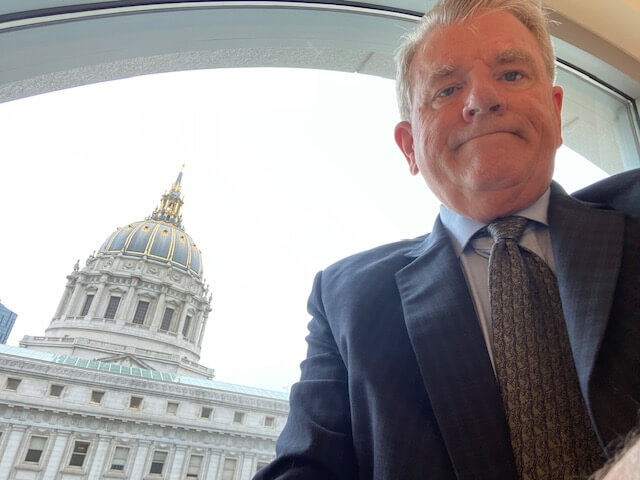
A chat with a private eye

Doing a deep dive into the history of a rental applicant. Determining disability status that entitles renters to special protections. Finding tenants who left like a thief in the night owing the landlords tens of thousands of dollars. Catching drug dealers in the act of peddling dope in apartments. Discovering renters who do not use the rental unit as their primary residence.
For this and more, we turn to Sam Brown in a two-part interview. Edited for brevity.
First off, Sam, I have fond childhood memories of my mother and I watching Tom Selleck play Magnum PI. I haven’t had the benefit of reading your book, “Private Eyes,” but I’m assuming that being a private eye is not as glamorous as Magnum PI in real life. Can you dispel myths about PI's and what a private eye does and doesn’t do?
I’m not a detective, I’m an investigator and find stuff by the hour mining through billions of records. As for the glamor part of the Ferarri and getting into fights, shooting bullets, and kicking down doors, that may have been back during the Maltese Falcon (a 1941 film starring Humphrey Bogart as a San Francisco private investigator).
Today, there is rampant crime and dysfunction and inevitably, it spills into rental units. It’s becoming more difficult to predict what may happen. It’s anarchy and the government hasn’t helped much.
So, much of my work is collecting, assembling, and developing information for legal purposes for attorneys, and real estate business folks and everything is above the board - this is based on public record. There are vast online systems and we populate reams of data, be it from real estate companies, tax liens, city government, the Internet, and whatnot.
You don't play both sides of the fence. You primarily work for property owners and not tenants, right?
That's my core focus. Every now and then, I take a hybrid case, and a notable one was investigating Ed Jew, who was later found to be in violation of residency requirements necessary to hold his position as a San Francisco Supervisor, and taking bribes.
I agree that human behavior is unpredictable. But one of the great things Daniel says is that the greatest predictors of dysfunction are prior incidents of dysfunction.
There are a lot of social woes and in my long career, I have never seen it so bad. There are people dying as a result of an intractable problem with narcotics. It is saddening.
My foremost goal is to avoid fentanyl and other unsavory elements from entering the rental unit in the first place, through the proper selection of a tenant.
People will go through elaborate means to disguise behavior as minor as an unauthorized pet or as egregious as operating a meth lab. And in commencing an unlawful detainer action - the trade word for an eviction - your role is to collect that evidence, right?
We do and have worked with Daniel for a long time. Not only gathering evidence but testifying in Superior Court and in front of the Rent Board. Bornstein Law has been great in articulating a case, but we need a case to build and evidence to sway the judge or jury. A landlord's suspicion of something nefarious going on, or inkling that there is a lease violation, is not enough to prevail in an eviction case. We need to document it.
We had one interesting case in particular recently that crossed Kathryn’s desk where we sat on a residence for a week at different intervals, hoping the occupants would come out. We knew they were there because the car was located at different locations around the block. And this is but one piece of the puzzle that let me join with other pieces of the puzzle, aided by the databases we put together.
We may have to sit on the rogue tenant. Lawyers and letters may not be sufficient to remove a bad actor absent evidence and that’s where we come into play. We are in the evidentiary business and in the unfortunate event a matter is escalated to court with the assistance of Bornstein Law, we can show that there is dysfunction, crime, or unsavory things occurring in and around rental units.
So, there's the surveillance part. There's the glamorous component of being a private eye. But with the glamor of chasing people around comes risk. Are you packing when you go on these expeditions? Do you ever fear for your safety?
No guns for me or other weapons. I don’t take the risks. The biggest danger in my opinion is knocking on a door and serving papers. I'm a fairly large person. but avoid conflicts. When there is a high-risk surveillance job I'm tasked with - say, hoodlums who have overtaken a rental property and are using it as a drug house or shoot-up gallery - I will always bring other people with me.
Yet I don't do so much of that anymore and I am more focused on technology.
Many of the competitors in this space whom I count as friends have been groomed from law enforcement careers. They are retired detectives and consummate professionals very capable of ferreting out information, but sometimes there is a technological disadvantage. Again, I'm not the one to kick down doors and I leave that to someone else.
Since we are on the topic of surveillance, let's talk about rules and what's admissible or not. What constraints do you have to contend with? The legal term is everyone has a "reasonable expectation of privacy."
There's a delicate balance. For instance, the use of cameras, which can be used in public areas, hallways, so-called "common areas" where people are walking back and forth. And this expectation of privacy also extends to guests.
I know of one gentleman who improperly recorded someone during an interview in the basement of a garage, was sued by a pair of attorneys, and had to pay out $50K.
Great point. I'm recording this call now, you agreed to it, and a critical point is that I had your consent to do so. And so where we get into trouble are these clandestine efforts to capture something without consent, and in violation of someone's privacy.
We have to maintain a level of integrity in this field. And while we have to respect people's privacy and understand the limitations that we have, there is tremendous value that can be gleaned from public areas in terms of documenting an unusual pattern of people coming and going at all hours. This would clearly be indicative of nefarious activity like narcotics dealing or prostitution.
Ultimately, it will be up to a judge or a jury to weigh the evidence, but we collect it. Daniel and his attorneys can present it in a compelling fashion.
In part two of our interview, we discuss different data points out of 100 billion+ records that landlords can access, owner move-in evictions, finding runaway tenants, how laws conceal rental risks, and more.
